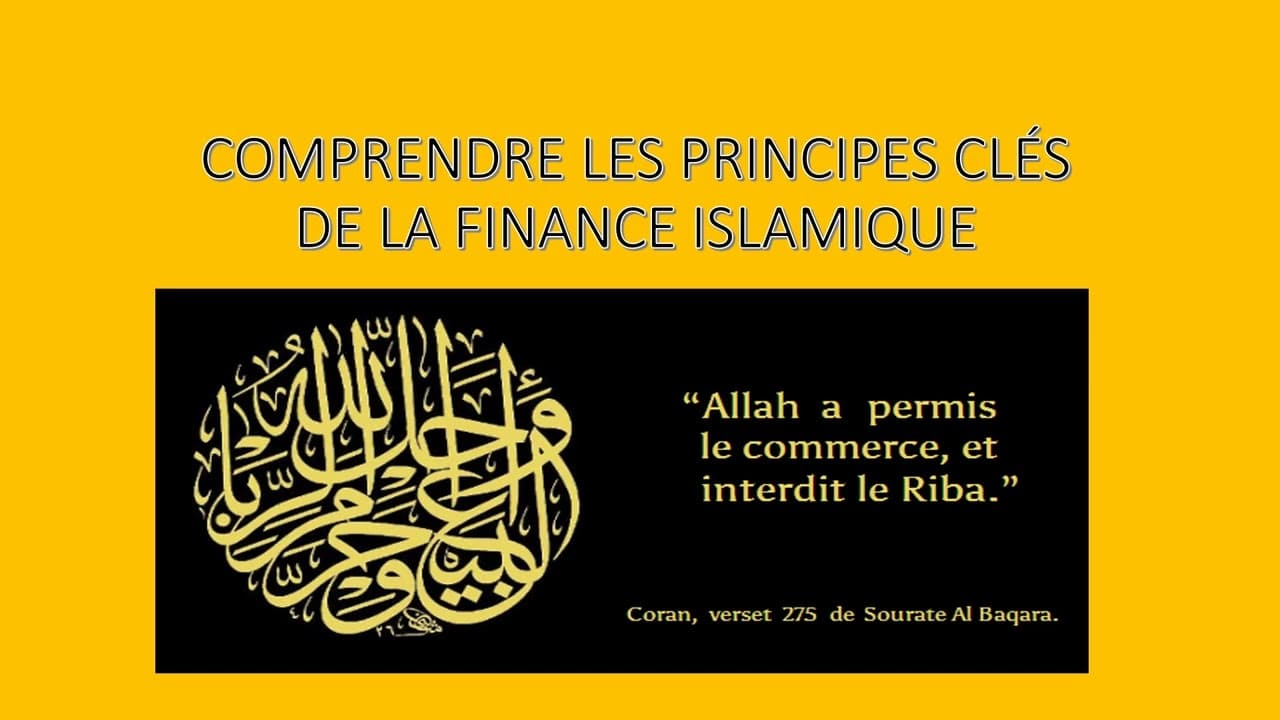Principles of Islamic Finance

What are the principles of Islamic Finance? Islamic finance is governed by Islamic law, Sharia. It respects a certain number of rules and prohibitions. It is a finance which has its own origins and draws its essence directly from religious precepts. To learn better about this finance think about its key concepts.
Thus, it is the result of the influence of religion on morality, then of morality on law, and finally of law on the economy to end up with finance.
In this post, Finance de Demain introduces you to the principles of Islamic finance. But before you start, here is a protocol that allows you to build your first internet business.

Get 200% Bonus after your first deposit. Use this promo code: argent2035
Let's go
???? The sources of Islamic law
To answer the question what are the fundamental principles of Islamic Finance is to seek to understand sources of Islamic law. The Islamic economy as a whole is based on the Koran, thehe holiest text in Islam. It is the word of God which was dictated to the prophet Muhammad by the angel Gabriel.
According to this book, the Prophet is the intermediary in charge of transmitting the word of God to Man. The Quran is therefore the main source of Islamic law and it prevails over all others. sources of Sharia'a. After this first source which is the Koran, the Sunnah (Hadith) is the second primary source of Islamic law.
Throughout the life of the Prophet, Muslims asked him to clarify certain passages from the Quran in order to be able to continue to live in accordance with the model that God had taught them. To do this, the Sunna of the Prophet were written.
It is a set of words, deeds and approvals of the Prophet on the basis of which Muslims can draw inspiration to define their moral orientation and their behavior.
As a secondary source of Islamic law, consensus (Ijma), reasoning by analogy (Qiyas) and interpretation (ijtihad). Word Ijma means " agreement on a question » and corresponds in the present case to an agreement reached by Muslim jurists on certain questions of law or on a particular situation.
The Qiya is a rule of law which is created on the basis of the interpretation of a new situation by using rules already existing within the Koran or the Sunna.
🌽 Prohibitions of Islamic finance
What is the riba ?
Le riba referring to any illicit enrichment. To any surplus income obtained without providing significant effort such as interest. The ulama have distinguished at least three types of riba. Thus, Muslim investors face several challenges and opportunities.
✔️ First form of riba : interest
Interest is the excess paid or claimed over an initial sum of money upon repayment. It is the remuneration for a loan, usually in the form of a periodic payment from the borrower to the lender.
At the time of Muhammad, the development of riba created situations of virtual slavery for borrowers unable to repay. It is this unique form of self-interest that the Prophet intended to forbid in the first place.
The Islamic conception of interest joins several other religions and schools of thought. Indeed, the origin of riba is found in the continuity of Judaism, Christianity and Islam.
Already in the Ancient Greece, Aristotle (384 BC) called the practice of interest detestable, because money was created for exchange and not to serve itself.
The Jewish tradition very clearly condemns the practice of lending at interest and it was not until the return of the capacity of Babylon that it was authorized, but for non-Jews only.
The Catholic Church was initially very explicit on this subject. Under the impetus of a certain Calvin in the XVIth century, the authorization was given to the Protestants and thereafter the practice spread to the whole of the Christian community.
For Muslim law, the prohibition of interest is formal since it draws its foundation from a clear principle of the Koran. Sura "The Exodus", verse 6, says that we must prevent goods from circulating exclusively in the hands of the rich.
Therefore, the loans of metals (gold, diamond, silver), food products are prohibited. This kind of riba, which is the most widespread in the world nowadays.
✔️ Second courtme of riba : the surplus collected on certain goods
The concrete surplus perceived during a direct exchange between certain types of goods of the same nature (gold, silver, currency, etc.) is also riba. This type of riba is known as ribâ al fadhl ou ribâ al bouyou.
✔️ Third form of riba : a particular advantage
Another form of riba was condemned by the Mohamet Companions in these terms: "Any loan which yields an advantage (conditioned on the lender in relation to what he initially advanced) constitutes riba ».
In terms of debts, most Islamic economic institutions advise participation arrangements between capital and labor.
This last rule takes up the Islamic principle that the borrower should not bear all the cost in the event of bankruptcy, because " it is Allah who decides this bankruptcy, and wants it to fall on all those concerned”.
This is why conventional debts are unacceptable. But conventional venture investment structures are practiced even at very small scales.
However, not all debt can be considered risky investment structures. For example, when a family buys a house, they are not investing in a risky business.
Likewise, the purchase of other goods for personal use, such as cars, furniture, etc. cannot seriously be considered as a risky investment in which the Islamic bank would share the risks and the profits.
???? The prohibition of uncertainty (Gharar)
Le Gharar constitutes the second major prohibition in Islamic finance. It is defined as the randomness of probable elements whose uncertain and risky nature makes it similar to games of chance.

Get 200% Bonus after your first deposit. Use this official Promo code: argent2035
It includes situations where the information is incomplete and the subject of the contract presents intrinsically risky and uncertain characteristics.
In the Quran, the Gharar is explicitly cited. The following expressions can be found in Surah 5, verses 90 and 91: “ O you who have believed! Wine, divination by the entrails of the victims as well as the drawing of lots (game of chance: Maysir) are just an unclean act of what Satan does.
Avoid it! …The devil seeks only to introduce among you the seeds of discord through animosity and hatred through wine and gambling, and to turn you away from invocation of God and prayer . So are you going to put an end to it? ».
However, certain conditions must be met. The uncertainty inherent in a contract must first be material and grounded in purpose to invalidate the contract.
Then, the contract must necessarily be a bilateral contract and not unilateral as is the case in a donation or a free service. Finally, the Gharar is accepted in cases where the very objective of the contract cannot be achieved without this uncertainty.
???? The prohibition of chance (Qimar) and speculation (Maysir)
In FI, it is forbidden to " earn money only by lending it to others. You have to really take part in the project. If the success of a project depends purely on chance, then there is Maysir.
It is this principle which is, among other things, retained to indicate that speculation is prohibited in Islamic finance.
Indeed, speculation often turns out much too risky. The objective is not to participate in a real economy, but to earn money randomly, without being interested in the project itself and its real performance.
The third major prohibition in Islamic finance is therefore the Qimar (chance) and Maysir (speculation). These two notions are closely linked to the previous great prohibition, the gharar. They are even sometimes confused within the literature.
In fact, the Qimar is often defined as being Maysir. However, the difference is that the Maysir goes well beyond games of chance since it corresponds to any unjustified enrichment.
Broadly, they are inherent in the form of contract in which the rights of the parties to the contract depend on a random event.
???? The prohibition of illicit investments
The last major ban is based on illicit investments. Islamic finance must be socially responsible. All the activities that Allah has created and all the benefits that flow from them are defined as " halal ». This rule leads to the prohibition of a large number of sectors of activity in which Muslims must not invest.
From a financial point of view, the underlyings of any type of contracts must also be Shariah-compliant. Quranic prohibitions moralists concern, by extension, commercial matters.
???? The requirements of Islamic finance
???? The profit and loss sharing principle (3P)
The first and foremost requirement in Islamic finance is profit and loss sharing. In fact, the principle of equity is the basis of the economic conception of Muslim law. This requirement of Islamic finance is presented as a alternative to the practice of self-interest which is haram.
In reality, one of the prohibitions of the FI is the prohibition of interest in all economic and financial operations. Stakeholders in banking activity are obliged to share the risks and therefore the profits or losses in order to legitimize the remuneration resulting from the investment project.
In reference to this principle, the FI is called " crowdfunding ". This principle also means that the clauses of a contract must equitably benefit all parties.
This is why in Islamic banks (IB) there are participatory contracts signed between the bank and its customers. These contracts allow BIs to finance, in whole or in part, depending on the type of contract, an investment project carried out by the client and to participate with him in the profits and losses.
When signing these contracts, the proportions of intervention in the future profits and possible losses of each party must be clearly defined.
In such contracts, the customer is more generally the manager of the project and the parties share without exception the losses and the profits according to the contractual clauses, except in the case of negligence or Proven gross negligence on the part of the client. The 3P principle establishes a new relationship between the investor (the bank) and the entrepreneur (the client).
???? Invest in tangible assets
The second main requirement of the IF is the backing of the investment to a tangible asset or Asset Backing. According to this requirement, all financial transactions must involve real assets to be valid under Shariah.
This principle of Asset Backing makes it possible to strengthen the potential in terms of stability and risk control and to ensure the connection of the financial sphere to the real sphere. Through this requirement, the IF contributes to the development of the real economy by creating non-risky economic activity.
???? Ownership requirements
Taking into account the particularity of the notion of property is a strong requirement in Islamic law. In fact, Islamic doctrine agrees neither with capitalism in his assertion that private property is the principle, nor with socialism when he considers socialist property as a general principle.
It admits at the same time the different forms of ownership when it adopts the principle of dual ownership (property in various forms) instead of that of the single form of property that capitalism and socialism make.
The desire to earn a living, to live comfortably, even to have ornaments or decorations and to protect oneself from a uncertain future is never considered like a bad thing.
He rather says that his precepts are the means to succeed in this field without trading it for failure in the hereafter. The Quran says that Allah is the sole owner of all that is in heaven and on earth.
The man however, is only Allah's steward on earth. He is responsible to He, of what is entrusted to him. Unlike the capitalist world, the notion of property according to Muslim law is divided into three categories. These are public property, state property and private property.
✔️ Public ownership
In Islam, public property refers to natural resources over which all people have equal rights. These resources are considered common property.
This property is placed under the guardianship and control of the State, and any citizen can enjoy it, as long as this does not infringe the right of other citizens to this property. In terms of privatization of public property, certain properties such as water, fire, grazing cannot be privatized.
The sentence of Mohammed according to which Men are associated in these three areas, led scholars to consider that the privatization of water, energy and agricultural land could not be authorized.
As a general rule, the privatization and/or nationalization of public property is the subject of debate within the doctrine.
✔️State property
This property includes certain natural resources as well as other properties that are not can be immediately privatizeds. Property in an Islamic state can be mobile or immobile. It can be acquired by conquest or by peaceful means.
Property that is unclaimed, unoccupied or without heirs, uncultivated land (mawaf) can be considered state property. During Muhammad's lifetime, one-fifth of the equipment captured from the enemy on the battlefield was considered state property.
However, Muhammad said: “The old lands and the fallow lands are for Allah and for his Messenger, then they are for you”. The jurists draw the conclusion that in the end, private property takes precedence over state property.
✔️ private property
There is a consensus among Islamic jurists and sociologists that Islam recognizes and encourages the individual right to private property. The Koran regularly addresses the problems of taxation, inheritance, the prohibition of theft, the legality of property.
Islam guarantees the protection of private property through severe penalties against thieves. Muhammad says that he who dies defending his property is like a martyr.
Islamic economists have classified the acquisition of private property into three categories: involuntary, contractual or non-contractual. When it is involuntary, it means that the individual has benefited from an inheritance, a bequest or a gift.
A non-contractual acquisition is an acquisition of the type of collection or exploitation of natural resources which has no previously been privately owned. However, contractual acquisition includes activities such as trading, buying, renting, hiring, …
However, Maliki and Hanbali jurists argue that if private property endangers the public interest, the state can limit the amount of an individual's private property. Only this point of view is not shared, it is debated in other schools of thought of Islamic law.
???? Equality requirements
The ban on usury considered riba between the contracting parties aims to establish religious, social and economic equality.
✔️Equality from the point of view of Islam
Islam is above all, justice, equality and honesty. Under Sharia, therefore, all believers are equal.
Muhammad says that no one can claim to be believing if he does not love for his brother what he loves for himself. This is why Islam considers usury as a tool for promoting selfishness.
This is why the verses relating to its prohibition in the Koran are preceded by several verses which encourage individuals to mutual cooperation, solidarity and charity. In our opinion, the degradation of values has favored the appearance of individual miseries, even within the developed countries.
This progress which our countries bear witness to, leaves man indifferent to man at the level of interpersonal relations. If Islam, in its industrialization, were to keep the substance of the Koranic principles, it would give the world a resounding lesson.
✔️ Social equality
The prohibition of interest is also intended to establish equality within a society between those who hold capital and he who fructifies it. Recognizing a surplus for the holder of capital, without it also being recognized for the user of this capital, constitutes a recognized privilege of capital in relation to work.
The practice of interest puts capital at the center of social inequalities. However, in Islamic law, wealth should not be a source of social inequality..
✔️ Economic equality
Islam seeks, if only on a theoretical level, to create a counterweight to the domination of the rich. From the Islamic point of view, wealth belongs to God, and that individuals are only the holders.
Wealth should not, therefore, be a source of economic power. It must flow continuously within the framework of what is permitted by Sharia and must be spent to help the poor and also enable them to earn.
🌽 The principle of justice
Justice is the moral principle that requires respect for law and fairness. Social justice requires fair living conditions for everyone.
If you repent, your capital will be yours, do no harm (taking more than you are entitled to), and you will not be harmed (by receiving less than you lent).
For Muslims, the prohibition of interest also targets the principle of justice. This notion of justice can be examined from three angles: the religious, social and economic angle
✔️ Justice from the perspective of Islam
If a Muslim seeks to gain at the expense of his brother by taking advantage of his need to subject him to abuse, he is committing an act of injustice. “No one can claim to be a believer if he does not love for his brother what he loves for himself”.
The Koran seeks to develop in Muslims the feeling that they all belong to the same community charged with a mission. However, usury is perceived as a means based on injustice, fostering disunity and the spirit of hatred.
This is why one of the priorities of the prophet was to condemn any benefit drawn directly or indirectly from this kind of practice.
✔️ Social justice
La social justice is also at the center of Islamic concerns. The prohibition of interest therefore goes in this direction.
In other words, it seeks to establish justice between the holders of funds and those who intervene through their work. The disadvantage of recognizing a capital surplus in relation to labor is not only moral.
Indeed, this kind of consideration leads us to lower the values of Man and to raise the value of matter. Beyond this observation, there are direct repercussions on the very structure of society.
Interest promotes social disparities by channeling wealth without risk or pain into the hands of a minority. This observation is in direct opposition to what the Koran proclaims, which prohibits monopolies.
✔️ Economic justice
In the traditional banking system, the creditor benefits from a pre-established amount represented by interest. In this case, by the loan contract, the capital and labor only belong to one person who is the taker who handles them at his own risk.
One can therefore wonder if there is really justice from an economic point of view in this kind of process. Because, if the capital deteriorates, it is the lessee who will assume full responsibility.
Islam says that if one wants to make the lender participate in the profit realized, it is necessary at the same time to make him participate in the loss one may incur. This is why, to play the balance on the side of the lender constitutes an injustice.
However, from the moment when the owner of the capital participates in the profits and losses, it is no longer a question of a loan but of a true solidarity cooperation that islam calls Mudaraba.
In Islamic law, wealth is not intended to be a source of economic power, nor to be immobilized. Wealth should be used to help others and also enable them to earn.
This denunciation of Islam leads us to understand that through the most direct form of help, zakat, those who receive (the poor, the weak, the orphanss) have a marginal tendency to consume.
This transfer of wealth would therefore increase demand and generate economic development to a certain extent.
???? Payment of Zakat
Zakat, the third pillar of Islam, is both a financial obligation, act of worship and right of God. It performs a central function in the implementation of the principle of equity, through the redistribution of wealth, from the richest to the needy.
Specifically, any Muslim holding for the duration of the lunar year (hawl) wealth above a tax threshold (nissab) 85 grams of gold. That's about 1500 euros today, is required to donate 2,5% to orphans, the poor, war refugees, etc.
The zakat must therefore be analyzed as a measure encouraging the Muslim to invest, pushing him to make his money bear fruit. This analysis is moreover confirmed by the treatment inflicted in Islam on hoarding, seen as an absolute lack of faith insofar as it is the sign of a lack of confidence in the future.
Le Quran states than : " those who hoard gold and silver, far from spending it on the path of God, announce to them a painful punishment ».
Thus, based on these ethical principles of Muslim law, the promoters of the Islamic financial system intend to establish a new model, carrying positive values and offering Muslims and non-Muslims the legitimate possibilities of benefiting from modern banking services by following the " way of God ».
However, I cannot leave you without offering you this guide to increase the referencing of your website. Click here to download this guide.
It's your turn



















Leave comments